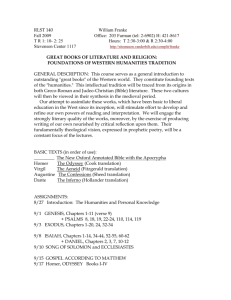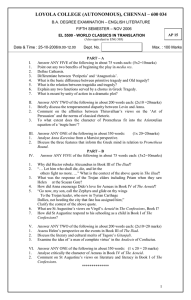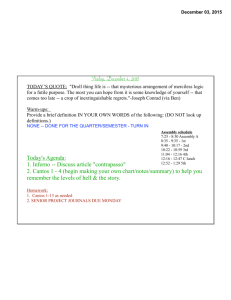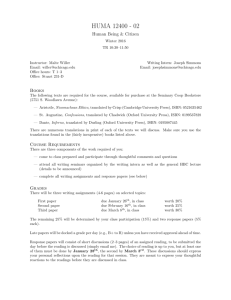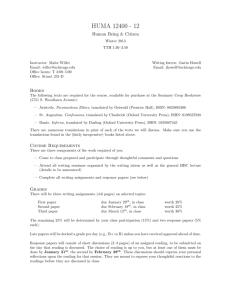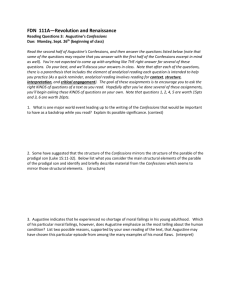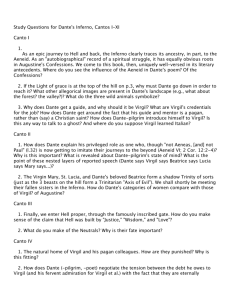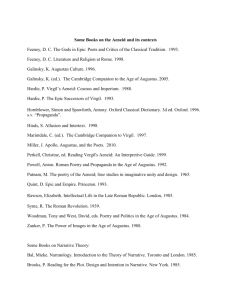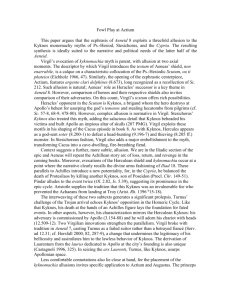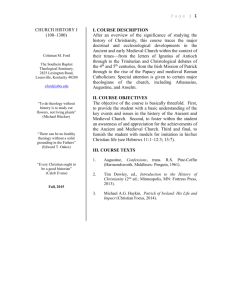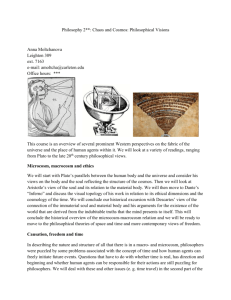RLST 140 William Franke
advertisement
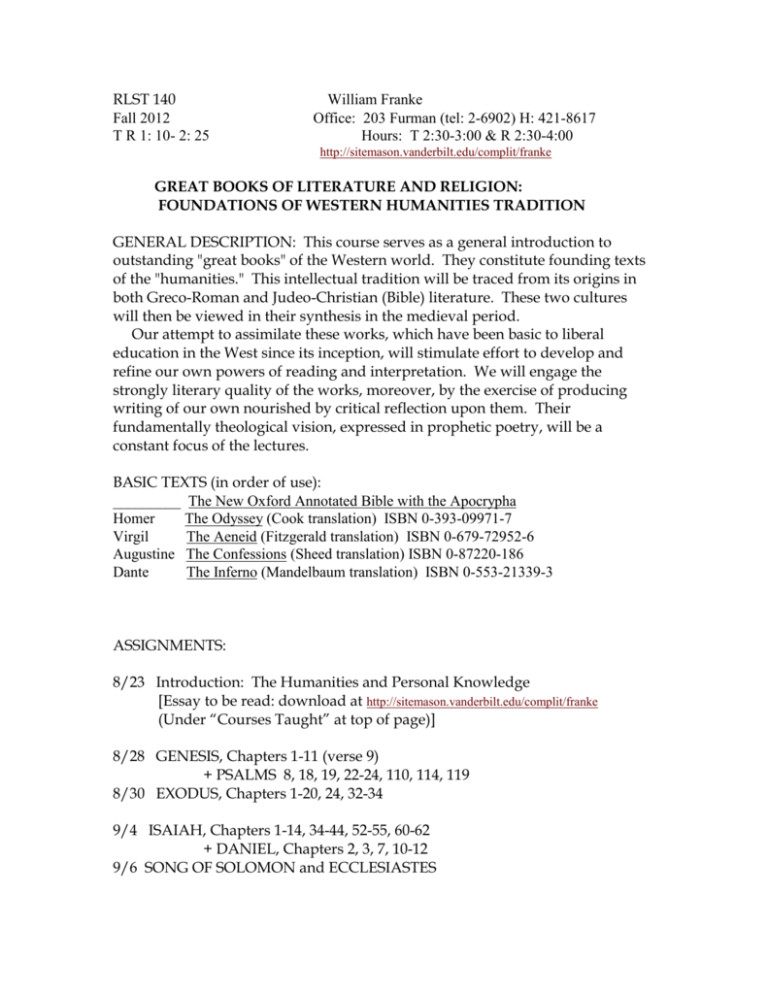
RLST 140 Fall 2012 T R 1: 10- 2: 25 William Franke Office: 203 Furman (tel: 2-6902) H: 421-8617 Hours: T 2:30-3:00 & R 2:30-4:00 http://sitemason.vanderbilt.edu/complit/franke GREAT BOOKS OF LITERATURE AND RELIGION: FOUNDATIONS OF WESTERN HUMANITIES TRADITION GENERAL DESCRIPTION: This course serves as a general introduction to outstanding "great books" of the Western world. They constitute founding texts of the "humanities." This intellectual tradition will be traced from its origins in both Greco-Roman and Judeo-Christian (Bible) literature. These two cultures will then be viewed in their synthesis in the medieval period. Our attempt to assimilate these works, which have been basic to liberal education in the West since its inception, will stimulate effort to develop and refine our own powers of reading and interpretation. We will engage the strongly literary quality of the works, moreover, by the exercise of producing writing of our own nourished by critical reflection upon them. Their fundamentally theological vision, expressed in prophetic poetry, will be a constant focus of the lectures. BASIC TEXTS (in order of use): _________ The New Oxford Annotated Bible with the Apocrypha Homer The Odyssey (Cook translation) ISBN 0-393-09971-7 Virgil The Aeneid (Fitzgerald translation) ISBN 0-679-72952-6 Augustine The Confessions (Sheed translation) ISBN 0-87220-186 Dante The Inferno (Mandelbaum translation) ISBN 0-553-21339-3 ASSIGNMENTS: 8/23 Introduction: The Humanities and Personal Knowledge [Essay to be read: download at http://sitemason.vanderbilt.edu/complit/franke (Under “Courses Taught” at top of page)] 8/28 GENESIS, Chapters 1-11 (verse 9) + PSALMS 8, 18, 19, 22-24, 110, 114, 119 8/30 EXODUS, Chapters 1-20, 24, 32-34 9/4 ISAIAH, Chapters 1-14, 34-44, 52-55, 60-62 + DANIEL, Chapters 2, 3, 7, 10-12 9/6 SONG OF SOLOMON and ECCLESIASTES 9/11 GOSPEL ACCORDING TO MATTHEW 9/13 Homer, ODYSSEY Books I-IV 9/18 9/20 “ “ Books V-VIII Homer, ODYSSEY Books IX-XII 9/25 9/27 “ “ Books XIII-XVI Homer, ODYSSEY Books XVII-XX 10/2 10/4 “ “ FALL BREAK 10/9 Virgil, AENEID Books XXI-XXIV Book I-II DUE: PAPER #1 10/11 “ “ Books II-III 10/16 10/18 Virgil, AENEID Virgil, AENEID Books IV-V Books VI-VII 10/23 10/25 Virgil, AENEID Virgil, AENEID Books VII-IX Books X-XII 10/30 Augustine, CONFESSIONS Books I-II 11/1 Augustine, CONFESSIONS Books III-IV 11/6 11/8 Augustine, CONFESSIONS Books V-VII Augustine, CONFESSIONS Books VIII-IX 11/13 Augustine, CONFESSIONS Books X-XI 11/15 Augustine, CONFESSIONS Books XII-XIII 11/20 11/22 THANKSGIVING BREAK “ “ 11/27 Dante, INFERNO 11/29 Dante, INFERNO 12/4 12/6 Dante, INFERNO Dante, INFERNO Cantos I-VIII Cantos IX-XIX Cantos XX-XXVI Cantos XXVII-XXXIV FINAL DUE DATE: PAPER #2 EVALUATION AND REQUIREMENTS: About every other week there will be a brief quiz consisting in short answer questions to check on basic familiarity with the reading. The average of the quiz grades will count as the equivalent of a paper in calculating final grades. Papers are to be expository essays, 5-7 pages in length, interpreting one or more of the works studied. Suggested paper topics will be issued at least a week prior to each due date, however students are free to write on a topic of their own choosing. Each student is required to turn in a total of TWO PAPERS. Presence and participation of each student in every class is expected. The Vanderbilt University Honor Code applies to all work submitted for this course. RECOMMENDED METHOD OF STUDY: The interpretation of assigned texts may begin by the student's formulating and analyzing main ideas in a notebook at the conclusion of each reading assignment. Another entry likewise composed of 1) summary statements and 2) evaluative remarks--on facing pages--may be made punctually after lectures and discussions of each class. These notes can be reviewed and discussed with instructor for the purpose of focusing essay topics based on the student's own emergent interests. OBJECTIVES TO KEEP IN MIND: Remember that in reading/writing you are competing only against yourself. The goal is to discover personal significance in the universal human experiences conveyed by great books and to develop your own discourse for articulating your experience of these texts and of life and human concerns generally. Since, unfortunately, I have to miss the first class (due to a lecture in China), I am giving you in written form the contents of my opening lecture. This essay articulates the idea of the humanities to be developed in the balance of the course. Don’t be bothered by the foreign languages—everything you need appears in English too. Please access this introductory lecture on my website under the following labels: http://sitemason.vanderbilt.edu/complit/franke Courses Taught Vanderbilt Fall 2012 RLST 140 Great Books of Literature and Religion
